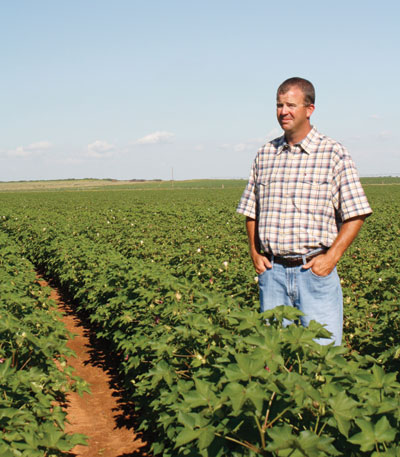
Ryan Smith of Meadow, Texas, has achieved good results on a small acreage of organic cotton and peanuts. His biggest financial saving is in seed costs, although the selection of organic cotton seed varieties is limited.
Photo by Janet Hunter
You won’t find many young farmers growing organic cotton on the South Plains of Texas. Veteran organic farmers will tell you that’s because it takes more experience and is riskier than farming with chemicals.
But those considerations didn’t stop Ryan Smith, a young farmer who planted his first 120 acres of organic cotton and 120 acres of organic peanuts three years ago. For him, the decision to switch was all about money.
Smith began farming in 1995 near Meadow, just down the road from Mark Wilkes, a founding member of the Texas Organic Cotton Marketing Cooperative. From the beginning, he watched Wilkes produce crops that were as good, or better, than any in the area. When he looked at Wilkes’ income and expenses, however, it was price and money that motivated him to try farming organically.
“Mark finally said, ‘just do it,’” Smith reports.
To date, the young farmer has no regrets.
“As far as income, the cotton’s made as much as $600 an acre more than conventional, under the same conditions,” he reports. While his labor, fuel and organic fertilizer expenses are higher for his organic crops than his conventional crops, he has no herbicide bills, and “the really big difference is the lower seed cost,” he says.
A customer of AgTexas Farm Credit Services since 2002, Smith says he was encouraged by his AgTexas loan officer, Doug Hoelscher, when he decided to try organic production.
“If it’ll work, AgTexas is for it. They want me to make money too,” he comments.
Going Organic on CRP Land
Getting into organic farming was fairly easy for Smith: He purchased and deep-broke land that had previously been enrolled in the Conservation Reserve Program (CRP). Because the property had remained grassland and had not been subjected to chemicals for the past decade, he did not have to wait the usual three years to have it certified organic.
Today, Smith is focused on amending and building up the soil fertility with organic cotton burrs and cow manure compost, which is the reason for his higher fertilizer bills. “The only negative,” he admits, “is not being able to give it a shot of nitrogen or whatever when it needs it.”
There’s another advantage to planting on former CRP grassland, he points out — it has fewer weeds than land that’s been farmed. Smith controls weeds by cultivation, followed by hand-hoeing, which boosts labor expenses. “The key to keeping the fields clean is to hit the weeds before they make seed,” he says. He also has a problem controlling Bermuda grass.
But from Smith’s perspective, herbicide-resistant seed has taken a lot of the challenge out of farming. “In a couple of days, you can spray and you’re caught up; with organic, if you get a couple of days behind, you don’t get caught up!” he says.
The organic crops constitute just a small percentage of Smith’s operation, however. He grows cotton, wheat, silage, alfalfa, peanuts, sorghum silage and watermelons and raises Angus cattle on just under 2,500 irrigated and dryland acres. Whether or not he converts additional land to organic production will depend on several factors.
“If the CRP deal is there, and the market is there for the organic crop, I think we would go that route.” As for converting conventional farmland to organic, he believes that weed control might be too big a challenge.
One crop he probably won’t try to grow organically, though, is hay. “It’s not worth it to grow organic hay unless the price is double. It is worth more to me to feed the hay to my own cattle,” he comments.
In the end, it all comes down to one thing for him: “Price is the bottom line — that’s why we do what we do,” he says.
– Staff